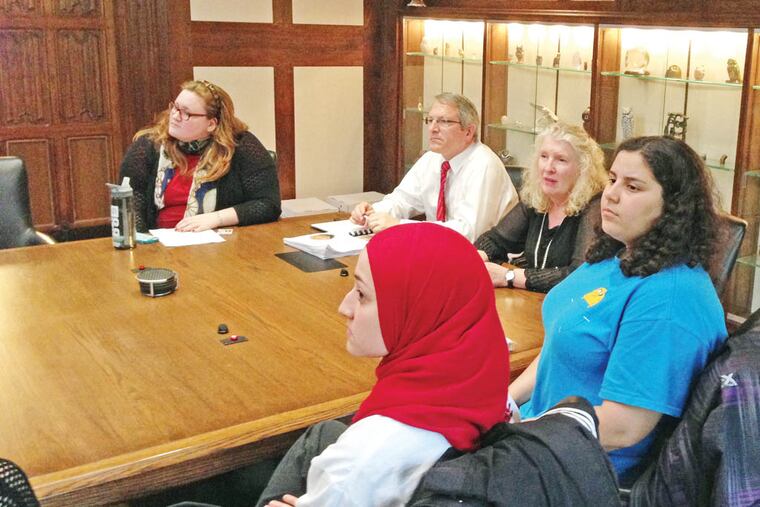Temple president stays in touch through teaching
Neil Theobald's course examines real challenges facing the school and lets students offer solutions.

WHEN TEMPLE University president Neil Theobald assesses the challenges facing the university, he can consult with senior administrators, faculty, trustees and a cadre of donors and alumni.
But the university's 10th president, whose tenure began in January 2013, also has other valuable resources: 22 freshmen in his "Organizational Change at Temple University" course, which wrapped up Monday.
The yearlong course examines challenges facing the school and asks students to identify and address other obstacles, such as campus safety, student health needs, dining services and financial literacy.
Students said that Theobald's honesty was refreshing and that they were surprised at the extent to which he acted upon their input.
"The first semester we sort of just went through issues," said Jeffrey Timlin, 19, a physics major. "And every now and then, when something would come up, as we would talk about the health center or we would talk about dining or how things were managed, we would have discussions with the president and the rest of the class. And then, in some of them, the next week he would come back and be like, 'Oh, we changed this because of what you guys said.' "
In one instance, students said they wanted the health center to be more convenient. As a result, Theobald extended the Saturday hours. In another case, students suggested making Temple's campus-police borders clearer. The president responded by instructing the communications department to develop a strategy.
But not every suggestion has led to immediate change. Students complained about a lack of healthy dining options on campus. Sodexo, the company contracted to provide food service, responded by agreeing to analyze the feedback, but it has not promised any changes.
Students also had the opportunity to hear firsthand about controversial decisions, such as the elimination of seven intercollegiate sports, or to comment on Theobald's inauguration speech before it was delivered.
"I felt like we had the background scoop on everything," said Samantha Rogers, 18, a psychology major. "When all this stuff with the athletic decisions was happening . . . two of my best friends are rowers and I got to be like, 'Here's what President Theobald said about your team.' "
After some initial leeriness, Timlin said, students realized they didn't have to sugarcoat things. "Because he was very open and honest about things, it kind of relaxed the class a little bit."
Theobald - who co-teaches the course with his wife, Sheona Mackenzie, a school psychologist - said the class allows him to see things from a student perspective and avoid "living in a bubble."
"It kind of gets your fingers through the organization," Theobald said. "People tell the president what the president wants to hear."
Following the athletic cuts, he said, "I got feedback from the students of how the responses were that I wasn't hearing anywhere."
For the final class, the president gave each student a signed book chronicling the university's history. He also has instructed the provost to meet regularly with the students.
Theobald - who began his education career as a high school math teacher - said that despite his workload, he really enjoys being in the classroom.
"[The students are] energetic, they're smart, they've got great ideas," he said.